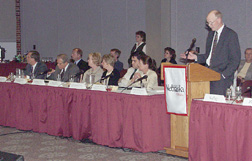UNMC’s rural health professional programs are on the forefront of rural health care nationwide, UNMC officials say.
On Friday, several UNMC rural health experts addressed the General Affairs Committee meeting of the University of Nebraska Board of Regents. The topic was UNMC’s rural health programs. 
Michael Sitorius, M.D., professor and Regents-named chairman of the UNMC family medicine department, said UNMC’s presence in more than 130 communities in Nebraska shows its commitment to serve as a 500-mile-wide campus.
“UNMC’s mission is to improve the health of Nebraskans through premier educational programs and outreach to underserved populations,” said Dr. Sitorius, a Cozad native. “We’re starting to see the fruits of our labors with some of our programs, and we’re continually trying to form partnerships and new programs to meet the needs of rural Nebraska. It can be difficult to stay ahead of the curve, but we’ve made tremendous strides over the last couple of decades.”
At Friday’s committee meeting, Dr. Sitorius was joined by several other UNMC rural health officials. They were:
- Roxanna Jokela, director of the UNMC Rural Health Education Network;
- Keith Mueller, Ph.D., professor of preventive and societal medicine and director of the Nebraska Center for Rural Health Research;
- Mary Haven, associate dean, UNMC School of Allied Health Professions;
- Carol Pullen, Ph.D., associate professor of the UNMC College of Nursing’s rural nursing education;
- Edward Roche, Ph.D., associate dean, UNMC College of Pharmacy; and
- Brian Lange, Ph.D., professor of dental practice management, College of Dentistry.
Jokela said that there are many key facets to having successful rural professional programs. Recruitment, training and retention all are necessary, she said.
“If we never get rural students in the door, or we don’t get them interested in health-care professions, we can’t serve the rural areas well,” Jokela said. “Once they’re enrolled, we have to provide them with training in rural areas to show them the benefits and disadvantages of those areas. When they start practicing, we need to make sure they’re not isolated. Among other things, we need to provide them with the means to get further degrees and continuing education through the Internet or satellite transmission.”
One way in which UNMC has interested students in health-care careers is through its annual eighth-grade health science meets, which are currently in their 10th year. Each year, more than 400 students participate in regional meets across the state, with about 60 students coming to Omaha in June for a week on the UNMC Omaha campus.
This fall, the first eighth-grade science meet alumnus to be accepted into medical school will begin classes at UNMC. Already, another alumnus is in his second year of dentistry school and a third has graduated from the College of Nursing.
“One of the greatest rewards of working at UNMC is the opportunity to see an eighth-grader participate in a science meet, take classes several years later at the Medical Center and then serve as a health-care professional in a rural community,” Jokela said.
Other highlights of UNMC’s rural health professional programs include:
- The Rural Health Opportunities Program (RHOP), in which accepted students spend between two and four years at either Chadron State College or Wayne State College. Provided they complete their education at those institutions with approved minimum grade point averages, they enroll at UNMC to study to become dentists, dental hygienists, pharmacists, medical technologists, physician assistants, physical therapists, physicians, radiation science professionals and nurses. From 1990-1999, about 70 percent of RHOP students in the allied health professions returned to rural areas to practice.
- The Family Medicine Residency Program Rural Training Track (RTT), which began in 1991 as one of the first three rural family medicine residency programs in the nation. Since then, 37 graduates — the most of any such program in the nation — have completed the RTT in Grand Island, Kearney, Scottsbluff and North Platte. Of those, 30 are working in rural Nebraska.
- Distance education, through which UNMC has educated hundred of students in rural areas. Notably, the UNMC College of Nursing delivers undergraduate and graduate courses to 23 sites in Nebraska. Ninety-eight percent of rural registered nurses who receive their bachelor’s degrees via distance education have stayed to practice in their rural communities.
Dr. Sitorius said none of the programs would be possible without the support of the rural communities, hospitals, volunteer faculty, state government and organizations throughout the state.
“We’ve all realized that to deliver the best health care to rural Nebraska, we need to work together on all of the pertinent issues,” Dr. Sitorius said. “We’ve made some great strides, and we look forward to staying on the cutting edge.”
Photo: Mike Sitorius, M.D., chairman of the UNMC family medicine department, addresses the NU Board of Regents at its General Affairs Committee meeting on Friday. Other UNMC officials who addressed the regents included, from left, Brian Lange, Ph.D., chairman of dental practice management ; Edward Roche, Ph.D., associate dean of the College of Pharmacy; Carol Pullen, Ph.D., associate professor of rural nursing education; Mary Haven, associate dean of the School of Allied Health Professions; Keith Mueller, Ph.D., professor of preventative and societal medicine; and Roxanna Jokela, director of the Rural Health Education Network.